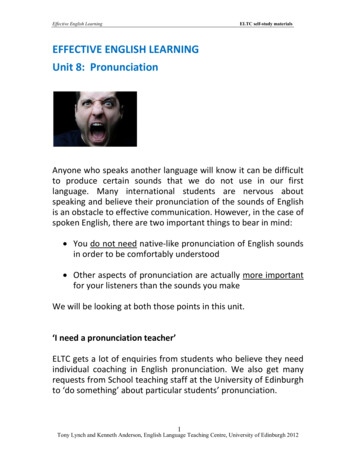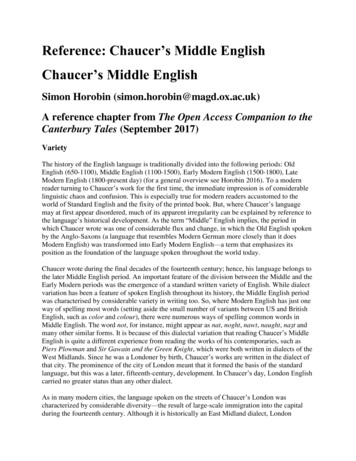
Transcription
Effective English LearningELTC self-study materialsEFFECTIVE ENGLISH LEARNINGUnit 8: PronunciationAnyone who speaks another language will know it can be difficultto produce certain sounds that we do not use in our firstlanguage. Many international students are nervous aboutspeaking and believe their pronunciation of the sounds of Englishis an obstacle to effective communication. However, in the case ofspoken English, there are two important things to bear in mind: You do not need native-like pronunciation of English soundsin order to be comfortably understood Other aspects of pronunciation are actually more importantfor your listeners than the sounds you makeWe will be looking at both those points in this unit.‘I need a pronunciation teacher’ELTC gets a lot of enquiries from students who believe they needindividual coaching in English pronunciation. We also get manyrequests from School teaching staff at the University of Edinburghto ‘do something’ about particular students’ pronunciation.1Tony Lynch and Kenneth Anderson, English Language Teaching Centre, University of Edinburgh 2012
Effective English LearningELTC self-study materialsLet’s explore first the assumption that pronunciation is somethingthat can be changed by teaching. Can it?Task 8.1Imagine you are attending an English academic writing class. Would you expect theteacher to correct your pronunciation when you ask a question about a grammar point?To compare your opinion with ours, click here for FeedbackThe evidence from research into second language learning is thatthe long-term effect of teachers' corrections is very limited.In the short term, a student who has just been corrected willprobably be able to imitate the teacher’s pronunciation of a wordimmediately afterwards. However, the chances are that the nexttime the student needs to use the word, they will produce itincorrectly, as they had done before.Task 8.2Why do you think it is that (adult) language learners tend to revert to their usualpronunciation of a problematic word, even after they have been corrected by a teacherand have successfully copied the teacher’s pronunciation?For Feedback, click hereResearch also shows that there are other factors, over which thelanguage teacher has no control, that exert a great influence on alearner’s pronunciation:2Tony Lynch and Kenneth Anderson, English Language Teaching Centre, University of Edinburgh 2012
Effective English LearningELTC self-study materialsThe factors which turn out to be important for accurate pronunciation are those whichteachers have the least influence on. Native language, the most important factor, resultsfrom historical accident. Similarly, the learner's ability to imitate foreign sounds isbeyond the control of the instructor. Similarly, length of residence in a country wherethe second language is spoken natively is largely beyond the instructor's control.Finally. the learner's concern for pronunciation accuracy is often the result of personalmotivations and attitudes established well before the student enters the classroom.(adapted from Purcell and Suter, 1980, in Pica 1994: 72)Task 8.3Which of these four sentences is the best summary of the views of Purcell and Suter?a)b)c)d)Teachers can do relatively little to improve a learner's pronunciationSome teachers can teach a learner to sound like a native speakerNo learner can sound like a native speakerFor the learner to sound native-like, the teacher must be a nativeTo check your decision, click hereIntelligibilityThere is good news and bad news about pronunciation. The badnews first: with very few exceptions, adult speakers of a secondlanguage will not achieve a native-like accent.The good news: you don’t need to sound like a native speaker.What you should aim for, according to Joanne Kenworthy, is 'to becomfortably intelligible' (Kenworthy 1987: 3).The use of the word ‘comfortable’ is important; it refers to thecomfort of the listeners, rather than the speaker. Comfortableintelligibility 'implies that second language learners should not3Tony Lynch and Kenneth Anderson, English Language Teaching Centre, University of Edinburgh 2012
Effective English LearningELTC self-study materialsonly make themselves understood to their listeners, but shouldnot irritate. This is not just a matter of pronunciation, but ofgeneral speaking habits' (Parkinson 1993: 56).Task 8.4Are there any features of English speech (of native or non-native speakers) that you findirritating or unpleasant?Are you aware of anything in the way you speak English that seems to cause (a)comprehension problems or (b) irritation, for people listening to you?For Feedback, click hereTask 8.5Read the extract below. Try to imagine what it sounded like as it was said. The speaker,Kim, was an international student in an English class at Edinburgh, responding to aquestion from another student.If she asked you for advice about improving her speaking, what would you tell her?4Tony Lynch and Kenneth Anderson, English Language Teaching Centre, University of Edinburgh 2012
Effective English LearningKim:ELTC self-study materialsfrom different childhood or different education uh woman don't woman can'tavoid can't avoid um being being femi uh feminist being female fema-- morefema-- more feminine (deep breath) more um more feminist feminist feminist more feminist like more calm and more um not positive not aggressive and there when the uh when the women face a certain technology in my my my in my case issame when I uh when I face the technology I have I don't have confidence this isusual situationTo compare your comments with ours, click hereIn the last few years, a new expression has come into use amonglanguage teachers: international intelligibility.Task 8.6What do you the term “international intelligibility” means?Watch Robin Walker’s video at http://www.youtube.com/watch?v Qoh07EovCsEThen write your definition of international intelligibilityand compare it with the Feedback hereThe central role of stress in spoken EnglishTwo types of stress are crucial in being understood: correctsyllable within a word, and appropriate stress of words in asentence.Syllable stress in wordsThe key to making yourself comfortably intelligible to otherpeople in English is to make sure you put the main stress on thecorrect syllable of word.Although we have a wide variety of accents in the British Isles, but- with one or two regional exceptions - everyone uses the samepattern of word stress. So British listeners are quite used tounderstanding the different sounds - especially vowels - produced5Tony Lynch and Kenneth Anderson, English Language Teaching Centre, University of Edinburgh 2012
Effective English LearningELTC self-study materialsby native and non-native speakers of English. But if a speakerchanges the word stress, their listeners can have great problemsin understanding what was said.Knowing how a word is stressed is essential when you use ityourself for the first time. Even if your pronunciation of thesounds is accurate, you will often be misunderstood if you placethe stress on the wrong syllable.Task 8.7Here are four words from the two previous paragraphs. Underline the part of the wordthat should be stressed:SYLLABLEACCURATEMISUNDERSTOODVARIETYCheck your answers hereWord stress in a sentenceIn English it is possible to put the main stress on (more or less) anyword in a sentence. Where the speaker places the main stressreflects the meaning they intend the listeners to understand.For example:1. This is your Italian book( not hers)2. This is your Italian book( not your French one)3. This is your Italian book( not that one)4. This is your Italian book( why did you say it wasn’t?)Try this website, Word stress in sentenceshttp://www.youtube.com/watch?v tpPCBWsVUp0&feature related6Tony Lynch and Kenneth Anderson, English Language Teaching Centre, University of Edinburgh 2012
Effective English LearningELTC self-study materialsRESOURCESDictionariesUse a dictionary to check the stress pattern of new and importantwords that you come across in your reading. If you are not surehow word stress is marked in your dictionary, check the User'sGuide (usually at the front). If you are not familiar with thephonemic symbols used to show pronunciation, your dictionarywill provide a guide explaining which sound each symbolrepresents, with words illustrating each sound.Task 8.8There are 26 letters in the English alphabet. How many English sounds are there?Check your answer by going nemic-chartWebsitesThere is a wealth of material on pronunciation on the Internet. Atthe moment, googling for "English pronunciation" produces over8 million hits.A good place to start, if you are interested in British Englishpronunciation, is the BBC Learning English website, which offers aseries of short video tutorialshttp://www.youtube.com/watch?v fdRmGvmeY1UTwo sites that our students have recommended:How to improve your /ht/ht prononce.htmImproving your ciation/improving-your-pronunciation/7Tony Lynch and Kenneth Anderson, English Language Teaching Centre, University of Edinburgh 2012
Effective English LearningELTC self-study materialsFor a demonstration of word stress:http://www.youtube.com/watch?v WX1rrFh4OZwBBC video on the sounds of nglish/grammar/pron/sounds/ADVICE FROM OTHER STUDENTSHere is the view of an international student at Edinburgh whomade a conscious effort to improve his speaking ability in English.I try to involve myself in situations where I have to speak and discuss with people in kitchens, social events, visits to friends and so forth. Or I record myself and tryto improve my pronunciation by repeating again and again the words that aredifficult for me to pronounce. I also request friends to help me by pointing out myweak points in speaking.Task 8.9How many techniques does that student use?Check your answer with the Feedback hereTask 8.10The advice below was chosen as the ‘Best Answer’ to the question “How can improvemy English pronunciation?”Which parts of it do you think are the most useful for you, in your situation?Are there any parts of it that you would not be able to adopt?1. Listen to spoken English as often as possible.Listen to how English speakers (on TV, the Net, in person) pronounce specific words andphrases, and "model" your pronunciation on what you hear.2. Learn the phonemic alphabet.Use the English phonemic alphabet page, which you find at the beginning of gooddictionaries, as a guide to pronouncing new words.8Tony Lynch and Kenneth Anderson, English Language Teaching Centre, University of Edinburgh 2012
Effective English LearningELTC self-study materials3. Don't forget to learn the word stress of a new word.Every English word has its own normal stress pattern. For example, the word "believe" hastwo syllables (be and lieve), but only the second syllable is stressed. Your dictionary shouldshow the syllable stress by an apostrophe (') before the syllable to be stressed: ‘be’lieve’.4. Work out which sounds cause you most problems in English.Depending what your first language is, you are likely to have problems with certain sounds.For example, most French speakers have difficulties with "th"; speakers of Mandarin havedifficulties with "r" or "l", and the “zh” in ‘usually’, and Arabic speakers with "p" and "b".5. Practise the sounds you find difficult.A useful exercise is a "minimal pair" exercise. For example, if you have difficultydistinguishing between "p" and "b", try practising pairs of words which are the same exceptfor the sound "p" and "b": For example, "pair" and "bear"; "pond" and "bond"; "pie" and "buy"etc.6. Be aware of intonation and sentence stress.Not all words in a sentence have equal stress, and generally only the "information" words(nouns and verbs) are stressed.'Where's the pen I gave you?'Where's the red pen I 'gave you?‘Where's the pen I gave you yesterday?The unstressed words (such as "the", "I", "you" and "and") don't carry as much "weight" asthe stressed words. They become much smaller in length, and are almost abbreviated. Forexample, "and" becomes "un".Changing stressSentence stress isn't "fixed" like word stress. In fact, you can stress words that arenormally unstressed in order to highlight different meanings.For example:I bought the book not the DVDI bought the book not ArthurI bought the book I didn’t borrow itIntonationThere are a couple of easy-to-remember rules about intonation. Usually our voices go up atthe end of the sentence to show a question, and down at the end to show a statement.Intonation is also important in "tag questions":9Tony Lynch and Kenneth Anderson, English Language Teaching Centre, University of Edinburgh 2012
Effective English LearningELTC self-study materialsYou know him, don't you?(With rising intonation on "don't you?" to show it's a question)You know him, don't you.(With falling intonation on "don't you" to show it's a statement thatyou expect the other person to agree with.)7. Learn to recognise spelling patterns.For example, "-tion" on the end of a word is pronounced "-shun", while "-sion" can bepronounced "-zhun". There are often many ways to pronounce a particular spelling pattern,but it certainly helps to know what the variations are. For example, the pattern "ough" canbe pronounced "uff" as in "enough" and "tough", or "or" as in "ought" and "bought" or "oh" asin "although" and "dough".8. Don't rush.If you speak too quickly, you risk skipping over some sounds, failing to pronounce themcompletely, or mixing them up. If you speak too slowly, you might end up sounding unnatural.But it's better to speak slowly and clearly than too ndex?qid 20081128034212AAQNJI0That’s the end of this unit on pronunciation and also of these Effective English Learningmaterials. A key element in improving your English, from this point on, will be practice –not just reading about ways of enhancing your English, but actually trying them out andseeing if they suit you.The English proverb ‘Practice makes perfect’ is over-optimistic. But what we can saywith certainty is that practice combined with feedback represents the most effectiveroute to better command of a language.I hope that these materials have given you some insights into the ways in which otherinternational students have made progress. If you devise your own informal techniquesfor learning English, I would be delighted to hear about them at A.J.Lynch@ed.ac.ukProf. Tony Lynch, English Language Teaching Centre10Tony Lynch and Kenneth Anderson, English Language Teaching Centre, University of Edinburgh 2012
Effective English LearningELTC self-study materialsPronunciationFeedback: study notes and answersTask 8.1As a teacher of English, I would only correct a student’s pronunciation in awriting class (or any other class than speaking) when I did not understandwhat they had said. For me, a pronunciation error is only ‘serious’ when itobstructs comprehension. To return to the page you were on, click hereTask 8.2The basic reason is that when we are saying something in a foreignlanguage, our mental focus is on the meaning of what we want to say. Ourattention (processing capacity) is directed solely on that message, and noton the form of what we want to say.This means it is natural to ‘forget’ what a teacher has said – perhaps, daysor weeks before – about the pronunciation of a particular word that weneed to use in what we want to say, when our mind is on the message.Other things have greater priority at the time of speaking.That is why, for example, it makes good sense to rehearse a presentationseveral times before giving it, so that we are familiar with what we want tosay, and therefore have time ( spare processing capacity) to focus on thepronunciation of particular key words when we are actually doing thepresentation. To return, click hereTask 8.3Sentence (a) is the best summary. Purcell and Suter's view is that, althoughsome exceptionally talented individuals may be predisposed to achieve anative-like accent, this is not due to teaching, but to a number of priorvariables over which the teacher has no control: (1) the native language, (2)11Tony Lynch and Kenneth Anderson, English Language Teaching Centre, University of Edinburgh 2012
Effective English LearningELTC self-study materialsability to imitate, (3) length of stay in the second language culture, and (4)concern for pronunciation accuracy. To return, click hereTask 8.4These are open questions, but some sources of irritation I have heardBritish people mention are: repetitive intonation; lack of clear stresspatterns; excessive hesitancy; excessive self-correction; mumbling;speaking too loud. To return, click hereTask 8.5The features that irritated Kim's listeners most were her hesitation and selfrepetition. She seemed to be driven by an excessive desire to choose theprecise word, rather than to get her message across. That can tax listeners'patience. To return, click hereTask 8.6I would define it as: ‘the extent to which a person can be easily understoodwhen speaking English to listeners from different language backgrounds’.Robin Walker, who you have just watched on video, is a leading authorityon pronunciation teaching. Among other things, he has written about the‘Lingua Franca Core’, which is the set of key elements of Englishpronunciation that an adult learner needs to master in order to beunderstood in situations where English is the language being used as alingua franca (as the common language for international communication).If you are interested in knowing what these core elements are, click here.Task 8.7The correct main stresses in those words are:SYLLableACCuratemisunderSTOODvaRIetyTo return, click here12Tony Lynch and Kenneth Anderson, English Language Teaching Centre, University of Edinburgh 2012
Effective English LearningELTC self-study materialsTask 8.8The BBC English phonemic chart shows 46 distinct sounds (phonemes) - 19vowels and diphthongs, and 27 consonants. To return, click hereTask 8.9This student seems to be a very active learner. He mentions three ways ofimproving: social practice in speaking with other people; individualpronunciation practice with an audio recorder; and getting feedback on hisperformance. To return, click hereTask 8.10 is an open questionReferences in this UnitKenworthy J. 1987. Teaching English Pronunciation. Harlow: Longman.Parkinson B. 1993. 'Teaching Phonology'. ACELT distance learning course materials.Institute for Applied Language Studies, University of Edinburgh.Pica T. 1994. 'Questions from the language classroom: research perspectives'. TESOLQuarterly 28/1: 49-79.Purcell E. and Suter R. 1980. 'Predictors of pronunciation accuracy: a re-examination'.Language Learning 30/2: 271-87.13Tony Lynch and Kenneth Anderson, English Language Teaching Centre, University of Edinburgh 2012
Effective English LearningELTC self-study materialsThe Lingua Franca Core (for teachers of English) by Robin WalkerThe Lingua Franca Core comprises seven areas in which it is essential to eliminate errorin our students’ pronunciation: Vowel quantity: vowel quality varies widely from one native speaker accent to another.However, the length differences between the vowels of English feature in all accents, andthe long English vowels are very long in comparison with average vowel lengths in otherlanguages. Because of this, the distinction between long and short vowels is moreimportant than exact vowel quality, and should be clear in speech. Consonant conflations: when a consonant of English does not occur in their mothertongue, learners may replace the ‘missing’ sound with something similar. Thesubstitution of one consonant for another can cause serious confusion for both native andnon-native listeners - for example, when a Korean speaker of English replaces /f/ with /p/and produces paint for faint, or copy for coffee. Phonetic approximations: another strategy is to use a sound from your mother tonguethat is close to the required English sound. However, some approximations lead tounintelligibility, as with/B/, the fricative sound the Spanish use for the ‘b’ in cabin, or /F/,the sound they use for the ‘g’ in again or ‘a girl’. Consonant cluster simplification: learners tend to use two radically different strategiesto deal with consonant clusters. Of the two, deleting one of the consonants to simplify acluster can affect intelligibility considerably, whilst the addition of a vowel seems tocause fewer problems. Turkish speakers of English, for example, will often insert a vowelbefore or after an ‘s’, so stone will sound like istone or sitone. Although this may soundforeign to a native speaker, it is much less damaging to intelligibility than eliminating oneof the two consonants, leaving tone or sone, for example. Prominence and weak forms: on the continuum between stress-timed and syllabletimed languages, English tends towards the stress-timing end. Learners often find nativespeakers harder to understand than non-natives. Pronunciation teaching should focus onhelping them achieving adequate prominence: with correct prominence, a learner’sEnglish is intelligible, even if they do not produce weak vowel used by native speakers. Tone groups: failing to use tone groups to divide the stream of speech into manageable,meaningful chunks has a serious effect on intelligibility. On the one hand, it may lead tobreaks in speech in unexpected places, reducing intelligibility; on the other, it reducesplanning time for the speaker, which will inevitably lead to new errors of all types. Nuclear/contrastive stress but not tone: one almost unique characteristic of English isthe way in which it varies the most prominent stress in a tone group to create meaning.Thus, the utterance They rented a FLAT does not carry the same meaning as TheyRENTED a flat. Many other languages use grammar changes to alter meaning, solearners often fail to pick up the significance of the tonic stress in English. Putting themain stress on the wrong word in a spoken sentence will direct the listener’s attention tothe wrong place, leading to confusion.Source: Robin rnationalintelligibility.htmlTo return to the main study unit, click here14Tony Lynch and Kenneth Anderson, English Language Teaching Centre, University of Edinburgh 2012
Effective English Learning ELTC self-study materials Tony Lynch and Kenneth Anderson, English Language Teaching Centre, University of Edinburgh 2012 5 Kim: from different childhood or different education uh woman don't woman can't avoid can't avoid um bein










